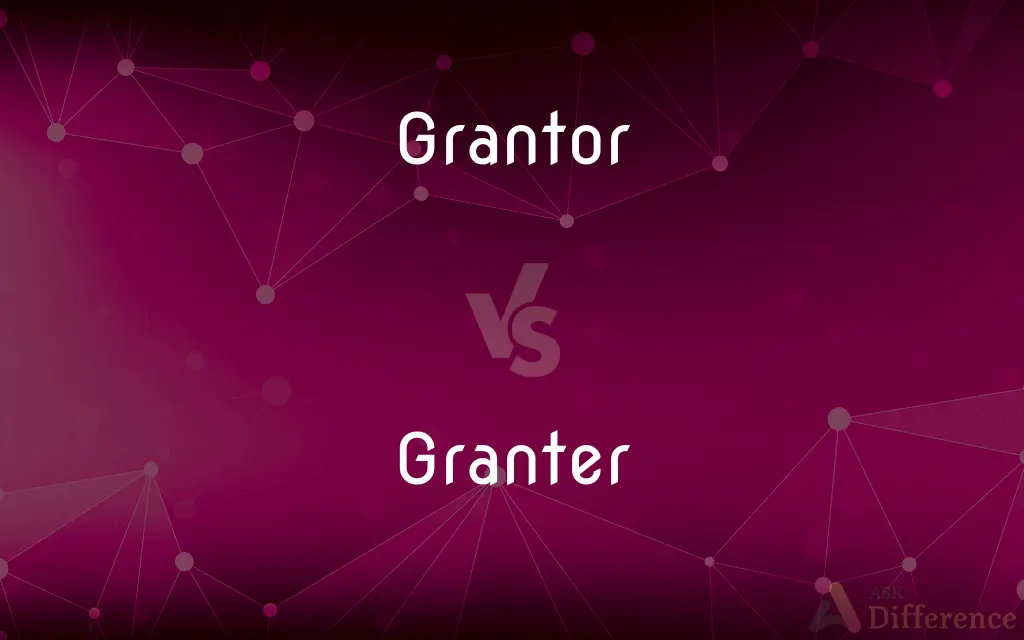Grantor vs. Granter — What's the Difference?
By Maham Liaqat & Urooj Arif — Updated on March 4, 2024
A grantor is someone who transfers property rights, often used in legal contexts, while a granter might be used more broadly but less commonly in formal documents.

Difference Between Grantor and Granter
Table of Contents
ADVERTISEMENT
Key Differences
A grantor is typically involved in legal transactions, such as in the creation of a trust or the transfer of property titles. This term is widely used in legal documents and real estate transactions to denote the individual or entity that is making the grant. On the other hand, a granter, though essentially serving the same role as a grantor, is less commonly used in formal legal contexts. It may appear in more general discussions or writings to refer to someone who grants something, not necessarily limited to property rights.
The grantor is the person who establishes the trust and transfers assets into it. This is a specific legal role with defined responsibilities and rights. Whereas the term granter could theoretically be used in this context, it does not carry the same precise legal connotations and might not be recognized formally in legal documents pertaining to trusts.
Regarding property transactions, the grantor is the seller or giver of the property right, and their name appears on the deed as the current owner who is transferring the property. Conversely, a granter, while understood in a similar capacity, might not be the preferred term in legal documents or real estate transactions due to its less specific usage.
When it comes to legal clarity and precision, the term grantor is preferred for its well-established meaning within legal and formal contexts. In contrast, granter might be chosen for its flexibility in informal or less technical discussions where legal precision is not paramount.
Despite their similarities, the choice between grantor and granter can also reflect the formality of the context. Legal professionals and documents favor "grantor" for its specific legal implications, while "granter" might be found in less formal or general discussions about granting or giving.
ADVERTISEMENT
Comparison Chart
Formality
High, preferred in legal contexts
Lower, less common in formal documents
Usage Context
Legal documents, real estate, trusts
General discussions, informal contexts
Legal Precision
Specific legal role and responsibilities
Less precise, more general usage
Commonality in Language
Common in legal and real estate language
Less common, more informal usage
Specificity
Specific to transferring property rights
Broadly refers to someone who grants
Compare with Definitions
Grantor
A person who donates.
The grantor donated the land to the city for a park.
Granter
A body awarding rights or licenses.
The granter issued a license for the new restaurant.
Grantor
The creator of a power of attorney.
The grantor appointed her son as her legal agent.
Granter
Someone who approves a request.
The granter of the scholarship awarded funds to ten students.
Grantor
A person who establishes a trust.
The grantor transferred her assets into the trust for her children.
Granter
An organization providing funds.
The granter supported multiple community projects.
Grantor
The seller in a property transaction.
The grantor signed the deed, officially transferring ownership.
Granter
A person giving permission.
The granter allowed the event to proceed in his venue.
Grantor
An entity granting a franchise.
The grantor awarded the franchise rights to the local business owner.
Granter
An individual or entity making a gift.
The granter made a significant donation to the museum.
Grantor
One that makes a grant.
Granter
To allow or consent to the fulfillment of (something requested)
Grant permission to speak frankly.
Grant a request.
Grantor
(legal) A person who grants something.
Granter
To give or confer officially or formally
Grant voting rights to citizens.
Grant diplomatic immunity.
Grantor
The person by whom a grant or conveyance is made.
Granter
To transfer (property) by a deed.
Grantor
A person who makes a grant in legal form;
Conveyed from grantor to grantee
Granter
To concede; acknowledge
I grant that your plan is ingenious, but you still will not find many backers.
Granter
The act of granting.
Granter
The document or provision in a document by which a grant is made.
Granter
One who grants.
Granter
A person who grants or gives something
Common Curiosities
Can the terms grantor and granter be used interchangeably?
While they can be used interchangeably in some contexts, "grantor" is preferred in legal situations for its precision.
What does it mean to be a granter?
Being a granter means to grant or give something, not necessarily limited to legal property transfers.
Who can be a grantor?
Any individual or entity legally capable of transferring property rights can be a grantor.
What is the main difference between a grantor and a granter?
The main difference lies in formality and specificity; "grantor" is formal and specific, while "granter" is more general.
Do all legal documents use the term grantor?
Most legal documents related to property or trust transfers use "grantor" due to its legal specificity.
Why is the term grantor preferred in legal contexts?
It's preferred for its clear legal implications and specificity in property and trust transactions.
Is knowledge of these terms important in real estate?
Yes, understanding these terms is crucial in real estate transactions and legal documents.
Can a granter revoke a grant?
This depends on the nature of the grant and the conditions under which it was given.
Is a grantor always an individual?
No, a grantor can also be an entity, such as a corporation or trust.
What responsibilities does a grantor have?
A grantor's responsibilities vary, but typically involve legally transferring ownership or rights to another party.
Can a granter be a company?
Yes, a granter can be a company, organization, or individual granting something.
In what context might I encounter the term granter?
You might encounter "granter" in informal discussions, articles, or less formal agreements.
What legal documents might list a grantor?
Deeds, trust documents, and powers of attorney often list a grantor.
What is the significance of understanding these terms?
Understanding these terms helps in accurately interpreting legal documents and the roles of parties involved in transactions.
How does one become a grantor?
By legally transferring property rights or establishing a trust, one becomes a grantor.
Share Your Discovery

Previous Comparison
Conductivity vs. Conductance
Next Comparison
Evaluation vs. EstimationAuthor Spotlight
Written by
Maham LiaqatCo-written by
Urooj ArifUrooj is a skilled content writer at Ask Difference, known for her exceptional ability to simplify complex topics into engaging and informative content. With a passion for research and a flair for clear, concise writing, she consistently delivers articles that resonate with our diverse audience.














































